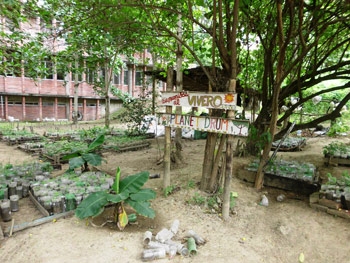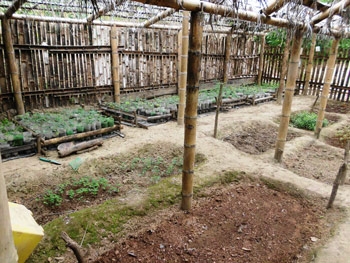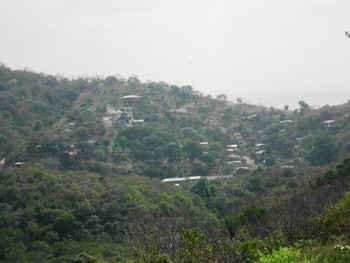By Becky Schroeder
I arrived at Planet Drum's Ecuador office in early June, enthusiastic about
beginning my Community Engagement Internship. I wasn't sure what to expect about
the work I'd be doing or about everyday life in Bahia, but at the end of August
with toned muscles and a new bioregional perspective, I was leaving a place that
had begun to feel like home.
As a graduate student studying international sustainable development, the act of
simply living in the city of Bahia de Caraquez for three months, observing and
absorbing, was an incredibly educational experience. Learning its history,
including the ravaging landslides due to El Nino in the late 1990s, and seeing
how the community reshaped itself into an eco-city was fascinating. As an
environmentalist, it is interesting to view the effect that the eco-city
development path has had on citizens' awareness of environmental issues. It was
surprising yet inspiring to note that in many ways the Bahians with whom I
interacted had a greater sense of care and urgency regarding the environment and
related issues than the people with whom I had grown up in the suburbs of
upstate New York. Additionally, it was interesting witnessing the roles and
actions of different actors doing development work in Bahia; there were many
more than I had expected for a small area on the Ecuadorian coast!
Planet Drum is an excellent work experience because it is anything but
monotonous. It is ideal for an internship because it combines bioregional theory
with practical hands-on activities. In the field, I learned about the daily
tasks of managing a greenhouse (vivero), revegetation techniques, and
composting. The field can also give you a great workout - between macheteing
trails, chopping bamboo, shoveling and mixing soil for planting, and bringing
water to freshly planted trees on steep, slippery hillsides. Just walking around
the hillside sites that PD plants trees at is powerful - you can see how loose
the soil is, imagine how devastating a landslide would be, and feel the impact
that all the trees you are nurturing will have in holding together the hillside
as they grow.

|
Welcome to the greenhouse! |
|
Inside the vivero. |
 |
The fieldwork provides an opportunity to improve Spanish skills, especially when
students from local schools come visit the greenhouse to help plant trees. The
students are curious and as you're working side-by-side, they will ask you all
of the essentials about your life in rapid-fire Spanish. The students collect
plastic bottles at their school for us (we transplant baby trees from beds of
soil into plastic bottles, then into the ground at the field sites), but
visiting the greenhouse allows them to actually see why they're saving the
bottles and experience the impact that reutilizing materials can have. For the
students, hands-on work is always more fun than being in a classroom, and of
course PD gets a lot of trees planted with their help!
Every day our job was something new and at a different location. Several times
we had the opportunity to see more areas of town while collecting seeds. One of
these times, a small child who had been riding around on his bike stopped to see
what we were doing. We told him, and he asked if he could help. We didn't
exchange many words, and I tacitly wondered why he wasn't in school, but we made
sure to thank him for helping the revegetation process.
This summer, we worked on watering three hillside sites that previous groups of
volunteers had planted trees at during the wet season (January-April). One of
them was behind Universidad Catolica, whose land also contains the PD greenhouse
facility; another provided us with beautiful views in the aptly-named community
overlooking Bahia, Bellavista; and the final site was at el Bosque en Medio de
Las Ruinas, the Forest Amidst the Ruins. Watering this last site was
particularly moving and eerie, as it is the hillside that experienced the tragic
landslide nearly fifteen years ago, when seventeen residents died. As you walk
on the trails between PD-planted trees, you can see old foundations of houses
and crumbling stone staircases, which remind you of the importance of the work.
In reality, PD has planted trees at a lot more than just these three sites, but
most of the other sites' trees are old enough that they don't need regular care.
Another PD intern who I was fortunate enough to cross paths with this summer,
from France, worked on collecting GPS data for all of the revegetation sites PD
has planted trees at since 2005!
 |
A view of the community Bellavista and one of our
hillside sites. |
Occasionally, the work involved fieldtrips. One day we got to tour a nearby
organic farm while taking trees to plant with young children who attend an
environmentally-focused school. This turned into a multifaceted experience
including simultaneously teaching, learning, tourism, and of course, fun!
Another time, we traveled to a town about 45 minutes away to deliver trees to
community leaders, who would then distribute them among their neighborhoods. Not
only was it a chance to get to see another region, but we got to talk with the
community's president as she accompanied us on our rounds. During this visit,
she brought to light problems that many of the community's residents are having
with their plants - the chemical pesticides they are using aren't working well
enough to eliminate pests, and their non-technical application of harsh
chemicals is probably causing a slew of additional issues. She mentioned
spraying one plant with a mosquito fumigator. Her comments got us thinking.
Afterwards, I researched recipes for organic pesticides that can be made out of
locally sourced ingredients. I found three simple recipes for organic pesticides
made out of tobacco leaves, hot peppers (ají), and Neem tree seeds - all of
which are abundantly available here! Planet Drum is already testing the tobacco
recipe in its greenhouse, and if the results are positive (so far so good!), we
can disseminate this knowledge to the agriculturally dependent communities that
surround Bahia.
Perhaps what struck me most during my stay was just how large of a positive
impact a small, very low-budget nonprofit project can make on a community.
Nearly every Ecuadorian around Bahia I talked to in my time here smiled with
acknowledgment and respect for the work PD does when I told them the purpose of
my stay in Ecuador. To complement the work, I loved staying in the communal
house with Clay, his family, and all of the other volunteers coming and going -
at one point there were three or four languages regularly being spoken in the
house, and everyone who stops by has exciting travel stories. Now, at the end of
my stay, I feel invested in the work Planet Drum is doing and the future of
Bahia, and I know that I'll continue to follow the accomplishments of PD and the
community. Even as I'm packing my suitcases, my mind is already planning my next
trip to Bahia, whenever that may be.
[Top]
<<<<><><>>>>
|

